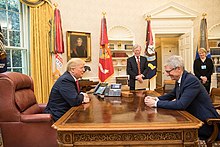Tim Cook
[4] During his tenure as the chief executive of Apple and while serving on its board of directors, he has advocated for the political reform of international and domestic surveillance, cybersecurity, national manufacturing, and environmental preservation.
[8] Cook is also on the boards of directors of Nike, Inc.[4] and the National Football Foundation;[9] he is a trustee of Duke University, his alma mater.
[25][26] After graduating from Auburn University, Cook spent twelve years in IBM's personal computer business, ultimately as director of North American fulfillment.
In a commencement speech at Auburn University, Cook said he decided to join Apple after meeting Jobs: Any purely rational consideration of cost and benefits lined up in Compaq's favor, and the people who knew me best advised me to stay at Compaq... On that day in early 1998, I listened to my intuition, not the left side of my brain or for that matter even the people who knew me best... no more than five minutes into my initial interview with Steve, I wanted to throw caution and logic to the wind and join Apple.
My intuition already knew that joining Apple was a once-in-a-lifetime opportunity to work for the creative genius and to be on the executive team that could resurrect a great American company.
[32] Cook closed factories and warehouses, and replaced them with contract manufacturers; this resulted in a reduction of the company's inventory from months to days.
[34] In January 2007,[35] Cook was promoted to lead operations and was chief executive in 2009, while Jobs, in failing health, was away on a leave of absence.
[36][37] After Jobs resigned as CEO and became chairman of the board, Cook was named the new chief executive officer of Apple Inc. on August 24, 2011.
Scott Forstall resigned as senior vice president of iOS after the poorly received launch of Apple Maps, and became an advisor to Cook until he eventually departed from the company in 2013.
[42] Forstall's duties were divided among four other Apple executives: design SVP Jony Ive assumed leadership of Apple's human interface team; Craig Federighi became the new head of iOS software engineering; services chief Eddy Cue became responsible for Maps and Siri; and Bob Mansfield, previously SVP of hardware engineering, became the head of a new technology group.
[46] On February 28, 2014, Cook made headlines when he challenged shareholders to "get out of the stock" if they did not share the company's views on sustainability and climate change.
[51][52] Cook was appointed chairman of the advisory board for Tsinghua University's economics school in October 2019 for a three-year term.
We urge you in the strongest terms to reverse course, to demonstrate that Apple puts values above market access, and to stand with the brave men and women fighting for basic rights and dignity in Hong Kong.
"[55] Cook explained in an internal letter why the company removed the Hong Kong mapping app used by protesters to coordinate movements.
[57] The deal – personally negotiated by Cook – paved the way for increased censorship by Apple in China, for example the removal of Muslim content, preventing users from entering numbers that refer to the date of the Tiananmen Square Massacre, censoring Chinese words like "human rights" or "democracy", and manipulating Apple Maps to support China in the Senkaku Islands dispute by making Chinese-claimed islands appear larger than they actually were.
[61][62] As Apple Inc. CEO, Cook regularly begins sending emails at 4:30 am each weekday, and in the past held Sunday-night staff meetings by telephone to prepare for the next week.
[63] In May 2013 Cook shared that his leadership focused on people, strategy, and execution; he explained, "If you get those three right the world is a great place.
[72] In 2015, Cook said he donated to Democratic senators Chuck Schumer and Patrick Leahy for their stances on e-book pricing and surveillance reform, respectively.
"[76][77] In 2018, at a privacy conference in Brussels, Cook expressed his opinions on the stockpiling of personal data by tech firms, suggesting that it amounted to surveillance and should make the public "very uncomfortable.
"[89] In October 2019, he talked about the decision and remarked on how it was thanks to LGBTQ people who had fought for their rights before him that paved the way for his success, and that he needed to let younger generations know that—in a coding analogy—he saw being gay as a feature his life had to offer rather than any problem.




